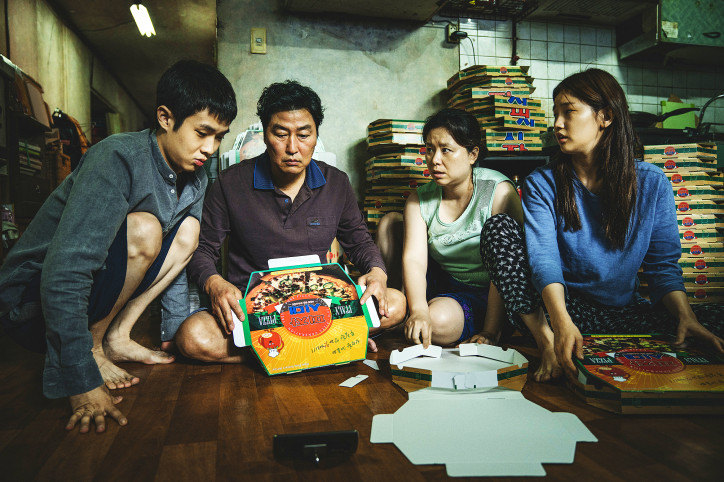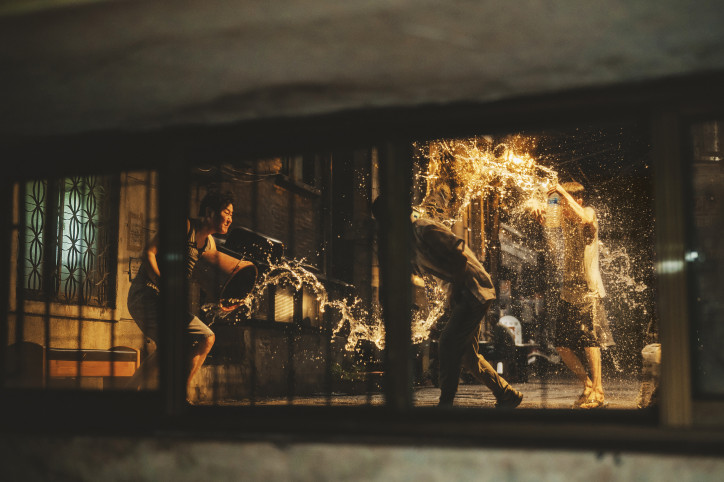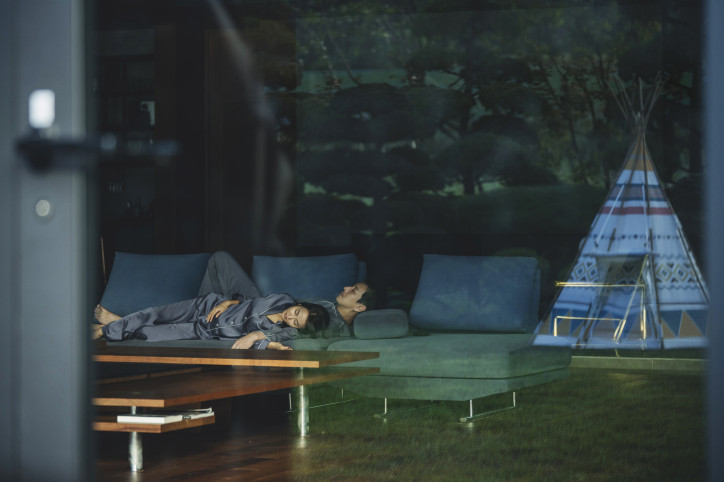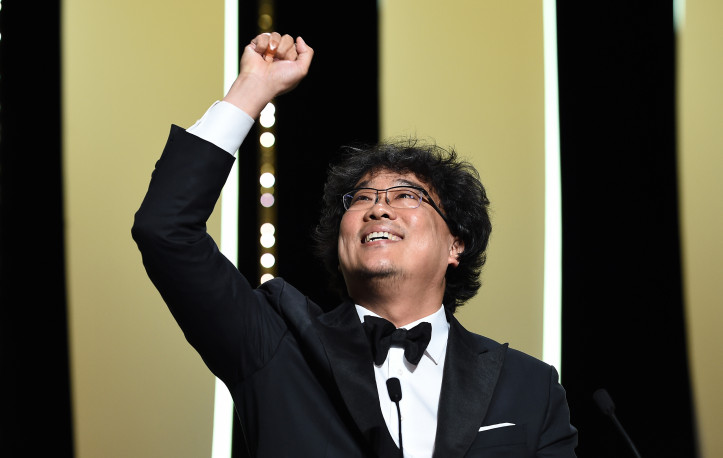
The first thing that comes to mind when I recall my meeting with Bong Joon-ho during Cannes Film Festival 2019 is that his global success hasn’t gone to his head. His mind is set on things other than the surrounding palms, yachts, red carpets, posh restaurants and never-ending professional events.
Before we started our interview in a restaurant by the French Riviera, he chatted with journalists about the films that were presented during this year’s competition. Sequins, camera flashes and magazine covers are definitely not his thing. Bong came to Cannes to hole up in a dark cinema, peek at the achievements of his colleagues from all around the world, and meet with his friend Quentin Tarantino. Both of them share an endless love for cinema. “Quentin is probably my most staunch supporter,” Bong jokes before we start the interview.Pulp Fiction 25 years ago in the very same place – has fallen in love with this incredible Korean director’s ingenuity. After watching Parasite , I was sure that I would be talking to a visionary who is ahead of his time. I have a feeling that even in 15 years, his films will still seem insanely good and that they will simply become immortal.
Mateusz Demski: To start off then, what kind of a genre would you say Parasite is? dark comedy? drama?
Bong Joon-ho: Dark horror, black comedy, social satire, action flick [ laughter ]. My US distributor, they sent me the review from Indiewire. This one guy had a good comment. The critic said that Bong Joon-ho himself is the genre, and that’s the comment that I like the most.
Your films are very, in a sense, sensational. They have a lot of genre elements, they are very enjoyable, they are very intense. What’s interesting is that nowadays they seem to be very angry, or at least there’s a very deep emotional sincerity underneath it. I’m wondering how you want to strike a balance between those elements?
I consider myself a genre film-maker. Sometimes I follow the conventions, sometimes I break them, but I don’t think I ever stray far out of that genre boundary. I feel more comfortable and relieved when I am within the genre boundaries, and I want to remain inside the boundaries too. However, that doesn’t mean that the way I use genre is your typical Hollywood style. In that sense, naturally I think you get to really feel the Korean sense of emotions. In the end, I think the emotions are shared by everyone who is human, but I suppose that this film shows more of that. For me, this film was more about this strange sense of sadness. The son character Ki-woo, he’s someone who doesn’t really get angry despite the fact that he faces very extreme situations and extreme poverty as well. He just accepts everything.

When the director of The Host chooses a title like Parasite , you expect science fiction or horror. Why did you choose that title?
In Korea, when we decided to call the film Parasite , we decided that a direct English translation would be best. Incidentally, in Korea The Host ‘s original title is Monster . Among English speakers, with The Host and Parasite , a lot of people make the connection and assume that the film will be a sci-fi film. So before, I always had to tell everyone that this is not a sci-fi film, this is not horror, but I think that some people still assume that it will be in this genre. Even in Korean press conferences, some journalists still ask the actors: “Who has a parasite in their body?” And I answer: “We’re all clean, in terms of sanitation, we’re all perfect.”
Your movie talks about inequalities. What do you think about the inequalities that we see in the movie? The rich family with the poor family – do you want to play with them, the contradictions?
Even if I don’t have to talk and mention polarization, the gap between rich and poor is something that’s very obvious. There’s also this big question of – despite all our efforts and all the improvements we make in the system – why isn’t this gap decreasing? I have this fear that comes from that question, and I think that’s very much related to the last scene. Rather than the fact that there is this huge gap, what’s more frightening is the thought that this isn’t going to be resolved in the future, in my children’s generation. That’s related to when the young protagonist of the film at the end tells himself that he will buy this house. He has that determination, but as an audience, when you look at him from a distance, you doubt it. We think, can he really? It seems so impossible for him, and that’s where the sadness comes from. We actually calculated how many years – with the average income he would receive – he would have to save to buy the house, without really spending anything. It would take around 547 years [laughter ].
He might also in between realize that owning a huge house is not the aim of life? The problem of being that society is based on materialism.
Of course his character will go through many things in the future. For now his determination comes not from the desire to become rich, but almost from this child-like desire to see his father again, because the father is punishing himself for the blood on his hands for the crimes that he’s committee; he’s locked himself up in this prison and his son wants to pull him out of there. That’s where the desire for this house comes from, not necessarily from the wealth it symbolizes.
I want to ask you something again about title, Parasite . If we assume that both families are parasites, which is the most dangerous one?
I do often say that even the rich family can be considered as parasites. The story is basically about this poor family infiltrating the house, but it’s also the rich family pulling them in, calling them into their home, because they can’t do anything by themselves – they need someone to dry for them, to wash the dishes for them. So in terms of labor, they are the parasites as well. I think the most dangerous ones are not the ones who are driven to a corner and become parasites, but the ones who with intention try to suck the blood of others. Who could that be in Parasite ? I don’t think that there are any straightforward villains in the movie.
Are you as part of the elite afraid that one day the underclass will attack you in your home? What kind of obligation do you feel towards them when you represent them?
It is honestly scary to think that someone will infiltrate and attack you in your house. But when you consider my actual house and my assets, I don’t think those people will have any place to hide, because if this the rich family and this is the poor family, my family will be around here, slightly more on this poor sides.

I feel that the secret star of Parasite is the house of the wealthy family. What were the qualities that you were looking for in this set? Was it an existing location, or something that you built especially for the film?
Both the rich house and the poor house – and even the neighborhood of the poor house – they were all built sets, aside from the streets. Because around 60% of the story takes place in the rich house, it was basically like another protagonist that required very detailed planning. Since the blocking of certain characters and the angle with which the characters view others is very important, by the time the script was finished the basic structure of the house was already determined. I drew out the basic sketch and handed it to the production designer and because it was a request from the director, the production designer had to respect the structure that I had built. When he took my sketch to an actual architect, the architect was like, no one builds houses this way, this can’t ever be an actual place. So the production designer really struggled in between me, as the director, and the architect. To achieve the structure that I wanted and to also actually make the house believable and realistic, the production designer had to work very hard. I think he did a great job, but when an actual architect analyzes the house, I’m sure he will think it’s very strange.
What exactly was the problem?
I don’t know! [ laughter ] They are very strange people. I love this kind of house, I want to live in this kind of house, but they always said: “This is ridiculous, this is fucking stupid.” [ laughter ] Crazy!
Creating the house is one thing, but creating all the different genre elements is another. How did you insert violence in the movie, especially at the end?
Personally, I don’t really like hardcore gore; I don’t like to see severed limbs or pools of blood. I think the more gory a film gets, the more distance the audience feels and the less believable it becomes to an audience. The audience would think, oh that’s great special effects, the make-up is amazing, the blood looks real. If you look at Hitchcock’s films, surprisingly his films don’t show a lot of blood, and I really respect that style. For this movie, I don’t think that there’s too much blood. I think what’s really important with violence is the timing of when the violence explodes. The step before or after the moment the audience expects it to appear on screen causes a lot of complex emotions. I think the rhythm and the beat, the tempo of how you structure the violence, is very important in a film.

So how can you enjoy the films of your colleagues then? A lot of South Korean films are so extremely violent – to think of something like I Saw the Devil. Do you enjoy them, or do you stay away from them?
I Saw the Devil is quite a scary film, and the director Kim Jee-woon was actually at Cannes a couple of days ago. But in reality, usually he’s a very introverted person and he said that he also had a hard time filming this movie, because it is such a difficult film to see. In terms of the film itself, it has great cinematic sensibility, and I think that’s why we could all endure the violence. He had very detailed and delicate direction in this film, so we could kind of withstand the violence.
Your film can be placed now among a couple of films – some of the journalists at Cannes compare it to Shoplifters by Kore-eda, also Us by Jordan Peele. In a way, it seems like class consciousness is really beginning to come back to very important, big films.
As I’m not a film critic, I don’t have that broad perspective to place all those films together. I haven’t seen Jordan Peele’s Us yet, but I was very surprised when I saw the trailer, because it features an illustration of decalcomania. Actually when I was first developing this project in 2013 and writing the treatment for it, the working title was “Decalcomania”. Does the actual film feature the decal?
Yes, I think so.
Originally, the film was planned as a decalcomania of the four members of the rich family and the four of the poor, where if you fold them they’re almost alike. But as the narrative changed to being more driven by the poor family, the title changed to Parasite. I think as a film-maker or an artist, we have no choice but to reflect the times we live in. We are inspired by the main situations going on these days. I’m not personally acquainted with Peele or Hirokazu, but I think as creators we all draw inspiration from the same times.
Parts of this interview have been edited and condensed for clarity and brevity.

Bong Joon-ho:
Born in South Korea in 1969, the director and screenwriter has continually raised questions in his films about institutions and social inequities. His filmography includes Barking Dogs Never Bite (2000), Memories of Murder (2003), Snowpiercer (2013) and Okja (2017). In 2006, The Host was presented at Cannes, where in 2011 he was chosen as the jury president for the Caméra d’Or. In 2019, he won the Palme d’Or with Parasite.
Introduction translated by Julia Potocka







